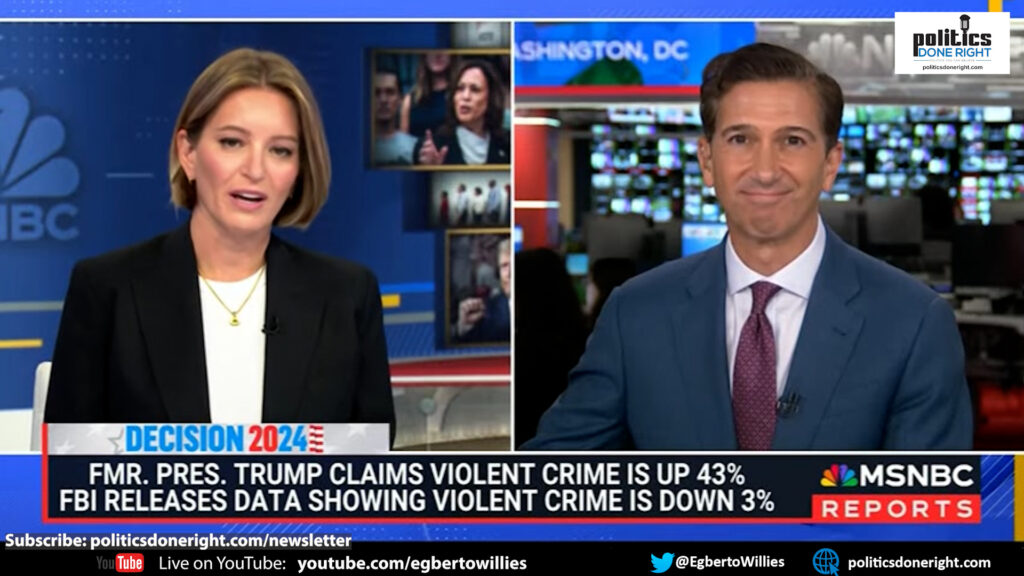There is new FBI data out that completely debunks the narrative of rampant exploding crime that Trump and MAGA need you to believe. It is false. Crimes are down.
Trump/MAGA crime lie debunked.
Podcasts (Video — Audio)
In the past few years, the Trump-aligned MAGA movement has weaponized fear, particularly around crime, to advance its political agenda. Time and again, Donald Trump and his supporters have propagated the narrative that American cities are crumbling under the weight of rampant violence. This fearmongering seeks to portray urban centers as dystopian wastelands where citizens are constantly under threat. Yet, this narrative is not just exaggerated—it is demonstrably false, as confirmed by the FBI data.
The latest FBI report reveals a reality starkly different from what Trump and his allies would have the public believe. Violent crime in the United States has not been rising, as Trump claims. It is on a significant downward trend. In 2023, the overall violent crime rate dropped by 3%, while the murder rate saw an even more dramatic 11.6% decrease. These are not marginal reductions; they represent the largest single-year drop in murder rates on record. When looking at these numbers, it is clear that the narrative of increasing violence is nothing more than political fiction.
Trump’s Strategy: Fear Over Facts
Donald Trump’s rhetoric on crime is emblematic of his broader political strategy—one that relies on fear to galvanize support. During his campaign events, Trump often invokes terrifying imagery of cities besieged by violence, claiming that one cannot even buy a loaf of bread without the threat of being mugged, shot, or worse. He repeatedly blames Democrats and figures like Vice President Kamala Harris for what he describes as a “crime wave.” Yet, when pressed, his claims consistently fall apart under scrutiny.
For instance, Trump cited a 43% rise in violent crime under Harris’s watch, a figure he attributes to government data. However, this claim is simply inaccurate. The FBI’s latest data, which includes reports from 94% of the U.S. population, unequivocally shows a decline in violent crime. Trump’s claim relies on a deliberate misrepresentation of outdated data and, worse, a refusal to acknowledge the pandemic-related crime surge, which has since abated. It should be noted that that surge occurred during Trump’s administration.
Media’s Role in Amplifying the Fear
A critical component of Trump’s fear-driven strategy is the role of the media, particularly local news outlets. The phrase “if it bleeds, it leads” encapsulates the media’s tendency to prioritize violent, shocking stories. Sensational headlines and gruesome images of violent crime tend to dominate news cycles, giving viewers the impression that crime is everywhere and that anyone could be the next victim. This skewed representation amplifies the perception of crime, even when crime rates fall.
The fear-based narrative is further reinforced by conservative news outlets and right-wing pundits who echo Trump’s claims without engaging with the facts. The result is a media environment that fosters a deep sense of insecurity, which Trump and his allies exploit for political gain. Yet, the FBI’s comprehensive data directly contradicts this narrative. Cities like New York, Los Angeles, and Chicago—often cited by Trump as examples of lawlessness—are reporting decreases in crime. In reality, the streets of these cities are safer than they have been in years.
The Bigger Picture: Crime, Perception, and Reality
One of the most insidious aspects of the crime debate is how it distorts the experience of most Americans. For the vast majority of people, violent crime is not something they encounter regularly, if at all. Crime, especially violent, tends to be highly localized, often occurring within specific communities or social networks. Random acts of violence that affect strangers are statistically rare, yet the constant media drumbeat makes them seem like a daily occurrence.
This is not to minimize the impact of crime where it does exist, but it is important to recognize that fear is weaponized for political ends. The pandemic caused a temporary spike in crime rates across the country, as the social and economic disruptions created conditions conducive to violence. However, as the country has recovered, crime rates have normalized, returning to pre-pandemic levels. This context is crucial, yet it is consistently ignored by those pushing the MAGA narrative of an America in decline.
Debunking the Myths, Restoring the Truth
The narrative of a violent, crumbling America is nothing more than a myth designed to stoke fear and distract from real issues like economic inequality, healthcare, and climate change. Trump and his MAGA followers rely on disinformation to sow division, but the facts tell a different story. As the FBI data shows, violent crime is decreasing, not increasing. Murder rates are plummeting, not skyrocketing. America is not a dystopia; it is a nation moving past the temporary crime surge that accompanied the unprecedented challenges of the pandemic.
As voters and citizens, it is imperative to rely on critical thinking rather than succumb to the fearmongering that defines Trump’s political messaging. The media plays a role in sensationalizing crime, but the responsibility ultimately lies with the public to dig deeper, look beyond headlines, and demand truth from their leaders. The real story is not one of fear and violence but of progress. Crime is down, and America is safer today than in years.
The FBI’s latest report is a testament to this reality. It debunks the false narrative of rising crime, proving once again that fear is the currency of the MAGA movement, not facts. By understanding the data and rejecting the lies, we can push back against the divisive rhetoric that seeks to tear the country apart and instead focus on building a future rooted in truth, safety, and justice for all.

